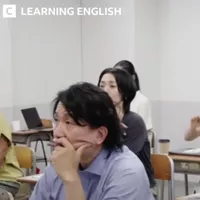Learning to smile again — News Review-6 Minute English | by 700 Eth | May, 2023 | Medium
Transcript:
Learning to smile again. This is News Review from BBC learning English. I'm Neil. And I'm Sian. Make sure you watch to the end to learn vocabulary about this story. Don't forget to subscribe to our channel, like this video, and try the quiz on our website. Now, the story: People in Japan have been taking lessons on how to smile again.
The law's now changed, so you don't have to wear a mask any more, but many people have complained that they've forgotten how to smile. Smile coaches have been helping people get used to smiling again. You've been looking at the headlines, Sian.
What's the vocabulary? OK, we have ‘grin', ‘ditches' and ‘life after'. This is News Review from BBC learning English. Let's look at our first headline. This is from The Guardian: OK. So, this headline is about the end of mask wearing rules in Japan. The word that we're looking at is ‘grin'. Now, Sian, ‘grin' that's a type of smile, isn't it? It is, but it's not just any smile, it's a really big one like this.
OK, as you can see, Sian is grinning from ear to ear, which is a common expression. But we can also use it for the kind of smile when you've done something wrong. So, we can say that a child has a cheeky grin, for example. Yes, and in this headline they use the expression ‘grin and bear it' which means ‘remain positive when something bad is happening'.
But there's something a bit different here. Yes, so, there's a kind of joke here. So, normally the spelling in this expression is ‘bear' b-e-a-r. So, that means to ‘deal with something', but here they've spelled it ‘bare' b-a-r-e, which means ‘not covered'.
So, they're making a joke about going barefaced — so, not having a mask on your face. That's right. Let's look at that again. Let's look at our next headline. This is from The Mainichi. So, this headline, like the first one, is about the ending of rules in Japan about wearing masks after Covid. The word we're looking at though is ‘ditches', which is a verb here.
But, it's useful to think of the noun ‘a ditch', which is that thing on the side of the road. Yeah, so, it's where all the water and waste from the road end up, but here we use ‘ditch' as a verb, and ‘to ditch something' is to throw it away'. So, if you don't need something any more, you ditch it. It's not just used for things though.
No, you can use it for ideas. You can ditch an idea if you think it's a bad one or you can ditch plans if they're not going to work. I ditched my travel plans during the Covid pandemic. Or, you can even ditch people. So, if we talk about ending a relationship, you can say you ditch your boyfriend or girlfriend. Doesn't sound very nice, but we use it. OK, let's look at that again.
Let's have our next headline. This is from The Japan Times: Yes, and we're going to look at this useful little phrase we use to talk about how things might be different in the future: ‘life after'. Yeah, so, here it's ‘life after masks' and it refers to how life will change for people in Japan when they stop wearing masks.
Yes, and we use this a lot when we're talking about the future, so, for example: students have to prepare for life after university, or a celebrity, a famous person, has to think about life after fame when they're not famous any more. Yeah, and it can also be used with people. So, thinking about the future without an important leader or a famous person, for example, are Argentina ready for life after Messi? So, he's going to retire one day. Let's look at that one more time.
We've had ‘grin' — ‘smile'. ‘Ditches' — ‘get rid of'. And ‘life after' — ‘a future without'. If you want to learn more vocabulary around this topic, check out this episode of 6 Minute English. Don't forget to click here to subscribe to our channel so you never miss another video.
Thank you for joining us, and goodbye. Goodbye.

